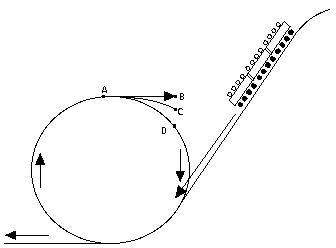|
The Sun |
 (Optional Addition)
(Optional Addition)
In the preceding section the motion of the "loop the loop" roller coaster was handled using the centrifugal force. You can also view this problem from the point of view of the outside world, using the centripetal force, but it is not as easy. At point A, on the top of the loop, both gravity and the centripetal force point downwards. So what is there that can keep riders in their seats? Let us try solve that motion, using the concept of the centripetal force. A car going around a loop, with radius R and velocity V, is accelerating at a rate of V2/R towards the center (as long as it stays on the rails), and is therefore subject to a centripetal force mV2/R, also directed to the center. When the car is at point A, that force points downwards. Let "down" be now be taken as the positive direction along the vertical axis. |